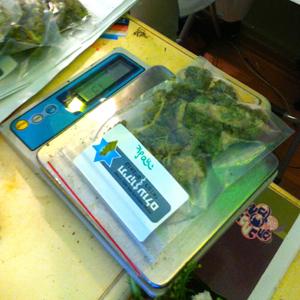Israeli company says its developed medical marijuana strain that won’t get you high
An Israeli company says it has developed a strain of cannabis that contains almost no THC, the chemical that produces a “high” for marijuana users. (Photo by Matthew Bell.)
Marijuana might be illegal, but more than a dozen U.S. states now allow the medicinal use of cannabis.
Of course, this is controversial, because medical pot still makes people high. But what if the psychoactive ingredient in marijuana, the chemical known as THC, could be removed? That is exactly what an Israeli company says it has managed to do.
It was an Israeli scientist who first isolated tetrahydrocannabinol — or THC — back in 1964. Now, an Israeli company claims it is the first to develop a strain of the cannabis plant that contains almost no THC at all. The company is called “Tikkun Olam,” which means “healing the world” in Hebrew. It grows cannabis in Israel and runs the only legal storefront dispensary in the country.
There is no sign outside to identify the small shop in downtown Tel Aviv, just a security guard who scrupulously checks ID cards of anyone wishing to enter. There is no smoking going on inside.
But the unmistakable smell of cured marijuana wafts out onto the sidewalk as customers come and go.
Medical marijuana has been legal in Israel for more than 10 years, though the use of cannabis did not take off until 2009. It is tightly controlled by the government, largely through the ministry of health. About 9,000 Israelis have a license to buy the stuff. Avi — a 60-year-old cancer survivor — is one of them.
“I had a cancer for six years,” he said, while volunteering at the cannabis dispensary. “Now, four years (later), I don’t have (anything).”
The pot might not have cured his cancer, but Avi says smoking it helped him get through the chemo treatments. And he is still smoking daily. A few weeks ago, Avi said he started using the new strain called “CBD.” It has almost no THC, which means smoking or ingesting it does not bring on the same intoxicating effects as most types of cannabis.
“I take it during the day,” Avi said. “It doesn’t make me down, you see?”
That is, it helps him stay alert, so he can work or drive or engage in daily activities in a normal way, he said.
“I can do everything with the CBD. With the other one, it’s a bit different, because it makes your muscles (relax),” he said. “For me, it’s the best.”
The new cannabis strain took about 3 years to develop through cross-breeding, according to Zach Klein of Tikkun Olam. There was no genetic engineering involved, he said. The new strain is all natural.
“Avidekel” is the nickname for the CBD strain, Klein said. It has only been available for a few weeks. So far, he said there are only about 10 regular users. But it is showing some promising results.
At Tikkun Olam’s cannabis clinic in Tel Aviv, where staff help new patients learn about using medical marijuana, Maayan Weisberg said CBD is already helping people who suffer from infections or nausea, but do not want to smoke to get high.
“Some of our patients, the THC bothers them,” Weisberg said. “It stops them from having a normal day. They want to be alert. They want to have a very strong grasp of reality. Some people just don’t enjoy the lack of control that the THC can make you feel. So, this is a good alternative for them.”
But Weisberg is quick to point out that this new and more benign strain of cannabis will simply not cut it for all medical marijuana users.
“Pain patients and patients that are used to narcotics, they need the THC,” she said. “If there’s no THC in the cannabis, they don’t benefit from the pain relief and the stress that their body is dealing with.”
That is just how one longtime cannabis advocate said he feels. Standing outside the cannabis dispensary with a plastic shopping bag full of cannabis, David Harari saidmedical marijuana has long helped him cope with the effects of Parkinson’s Disease, like the uncontrollable shaking.
When the shaking starts, Harari said smoking as little as half of a cannabis cigarette makes it stop right away.
“The THC helps me,” he said. “I’m skeptical.”
Harari said he doesn’t have much interest in trying the new cannabis strain.
Klein said his company is getting inquiries from growers abroad, including in the United States. But international collaboration would be tough, because with or without THC, marijuana is still a controlled substance.
